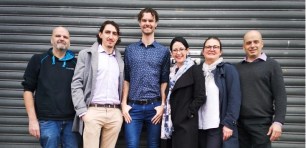
Harrison.ai co-founders Dimitry Tran (left) and Dr Aengus Tran (right), with Sonic Healthcare CEO Dr Colin Goldschmidt. Source: supplied.
Aussie healthtech startup Harrison.ai has raised a whopping $129 million in Series B funding, for its tech using artificial intelligence to relieve some of the strain on healthcare systems around the world.
Headed up by brothers and co-founders Dimitry Tran and Dr Aengus Tran, the startup partners with medical providers to build AI solutions to improve healthcare outcomes, with a focus on the medical imaging sector.
In 2020, for example, the startup formed a joint venture with I-MED Radiology Network to create Annalise.ai. The new venture has since rolled out its AI product that can identify 124 findings from chest X-rays much more quickly than the human eye.
The new funding has been announced in conjunction with a new joint venture, this time with ASX-listed medical diagnostics company Sonic Healthcare, to co-develop and commercialise a suite of AI-powered pathology solutions.
Having trained as a medical doctor himself, chief executive Dr Aengus Tran is passionate about improving patient outcomes, he tells SmartCompany.
“This is the best way I know to scale that,” he explains.
The vision is to provide AI solutions that help clinicians offer better and more efficient services, across various healthcare verticals.
Harrison.ai brings proven methodologies and AI tech to the table, while its partners bring specific sector expertise.
Harrison.ai gaining traction
This raise follows a $29 million Series A in December 2019, which fueled the rollout of Annalise.ai.
While Tran does not reveal any details around revenue, he does say the product has seen “tremendous traction” since then.
After 18 months in the market, the tech is used by about 25% of Aussie radiologists, he says, helping approximately 5000 patients each month.
Through the new joint venture, Sonic Healthcare will also roll out the Annalise.ai technology in 200 of its own medical imaging clinics.
Tran says the success of the I-MED partnership was more than a financial win. It was also the first real proof point that the startup could build scalable and repeatable operating models which, when combined with medical expertise, could secure regulatory approval and achieve significant reach quickly.
A global healthcare challenge
As well as rolling out the new joint venture with Sonic Healthcare, Tran and the team are now doubling down on the Annalise.ai product.
Having received regulatory approval in the UK, Europe and a handful of Asian countries, they have their sights set overseas.
Ultimately, Tran sees Harrison.ai’s tech in use all over the world, in diagnostics, biopsies and even treatment of various diseases.
“It’s really an end-to-end vision of how AI can comprehensively scale the capacity of existing clinicians, and enable them to do more with the same amount of resources,” he says.
Healthcare systems all over the world are stretched, he explains, and the COVID-19 pandemic has laid bare the extent of the problem.
Training new doctors to fill the gaps takes a decade or more, Tran says, but tech tools can help scale the capacity of individual clinicians, while still allowing them to maintain a human relationship with their patients.
“I see this as a necessity … to use innovation to tackle this from a slightly different angle,” Tran says.
Handpicked for you

Mr Yum raises $89 million to build “Shopify for restaurants”



COMMENTS
SmartCompany is committed to hosting lively discussions. Help us keep the conversation useful, interesting and welcoming. We aim to publish comments quickly in the interest of promoting robust conversation, but we’re a small team and we deploy filters to protect against legal risk. Occasionally your comment may be held up while it is being reviewed, but we’re working as fast as we can to keep the conversation rolling.
The SmartCompany comment section is members-only content. Please subscribe to leave a comment.
The SmartCompany comment section is members-only content. Please login to leave a comment.